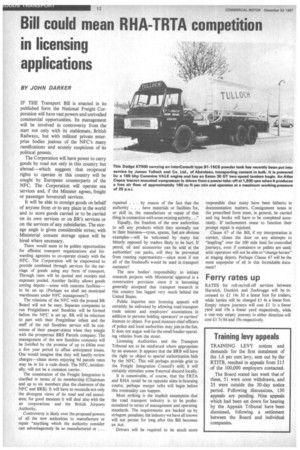Bill could mean RHA-TRTA competition in licensing applications
Page 14

If you've noticed an error in this article please click here to report it so we can fix it.
BY JOHN DARKER IF THE Transport Bill is enacted in its published form the National Freight Corporation will have vast powers and unrivalled commercial opportunities. Its management will be involved in controversy from the start not only with its stablemate, British Railways, but with militant private enterprise bodies jealous of the NFC's many ramifications and acutely suspicious of its political genesis.
The Corporation will have power to carry goods by road not only in this country but abroad—which suggests that reciprocal rights to operate in this country will be sought by European counterparts of the NFC. The Corporation will operate sea services and, if the Minister agrees, freight or passenger hovercraft services.
It will be able to consign goods on behalf of anyone from or to any place in the world and to store goods carried or to be carried on its own services or on BR's services or on the services of any subsidiaries. The storage angle is given considerable stress; with Ministerial consent storage space will be hired where necessary.
There would seem to be golden opportunities for efficient transport organizations and forwarding agencies to co-operate closely with the NFC. The Corporation will be empowered to provide combined through services for the carriage of goods using any form of transport. Through rates will be quoted and receipts and expenses pooled. Another facility allows goods sorting depots—some with customs facilities— to be set up. (Perhaps we shall see municipal warehouses under NFC management?) The relations of the NFC with the pruned BR Board will not be easy. Separate companies to run Freightliners and Sundries will be formed before the NFC is set up. BR will be reluctant to part with their Freightliner infant and the staff of the rail Sundries service will be conscious of their pauper-status when they mingle with the prosperous BRS Parcels company. The management of the new Sundries company will be fortified by the promise of up to £60m over a five year period to offset anticipated losses. One would imagine that they will hastily review charges—chain stores enjoying 9d parcels rates may be in for a rude shock. The NFC, incidentally, will not be a common carrier.
The constitution of the Freight Integration is clarified in terms of its membership (Chairman and up to six members plus the chairmen of the NFC and BRB). It will have to reconcile not only the divergent views of its road and rail associates; for good measure it will deal also with the air corporations and the British Airports Authority.
Controversy is likely over the proposed powers of all the new authorities to manufacture or repair "anything which the authority consider can advantageously be so manufactured or . . repaired . . . by reason of the fact that the authority . . . have materials or facilities for, or skill in, the manufacture or repair of that thing in connection with some existing activity...."
Equally, the freedom of the new authorities to sell any products which they normally use in their business—tyres, spares, fuel are obvious examples—will be welcomed by many but bitterly opposed by traders likely to be hurt. If petrol, oil and accessories can be sold at the authorities' car parks, will they be prevented from running supermarkets—since most if not all of the foodstuffs would be used in transport canteens?
The new bodies' responsibility to initiate research projects with Ministerial approval is a constructive provision since it is becoming generally accepted that transport research in this country has lagged very much behind the United States.
Public inquiries into licensing appeals will certainly be enlivened by allowing road transport trade unions and employers' associations in addition to persons holding operators' or carriers' licences to object. For good measure chief officers of police and local authorities may join in the fun. It does not augur well for the small haulier operating vehicles from the street.
Licensing Authorities and the Transport Tribunal are to be reinforced where appropriate by an assessor. It appears that the BRB will have the right to object to special authorization bids by the NFC. This will perhaps provide grist to the Freight Integration Council's mill; it will certainly stimulate some fraternal discord locally.
It is conceivable, of course, that the TRTA and RHA could be on opposite sides in licensing courts; perhaps merger talks will begin before this eventuality can happen.
Most striking is the implicit assumption that the road transport industry is to be professionalized in terms of management and operating standards. The requirements are backed up by stringent penalties; the industry we have all known will not persist for long after this Bill becomes an Act.
Drivers will be required to be much more responsible than many have been hitherto in documentation matters. Consignment notes in the prescribed form must, in general, be carried and log books will have to be completed accurately. If tachometers cease to function their prompt repair is enjoined.
Clause 67 of the Bill, if my interpretation is correct, closes the door on any attempts to "leapfrog" over the 100 mile limit for controlled journeys, even if containers or pallets are used; artic operators will not be able to "change horses" at staging depots. Perhaps Clause 67 will be the most unpopular of all in this formidable document?
Ferry rates up
RATES for roll-on/roll-off services between Harwich, Dunkirk and Zeebrugge will be increased to £1 14s 3d a linear foot for trailers, while lorries will be charged £1 4s a linear foot. Empty return journeys will cost £1 Is a linear yard and 19s a linear yard respectively, while a one-way empty journey in either direction will cost £1 7s 9d and 19s respectively.




















































































